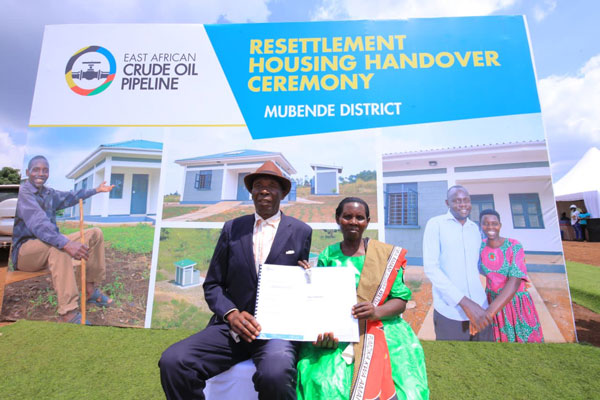
Kampala, Uganda | THE INDEPENDENT | The Petroleum Authority of Uganda -PAU has hit back at Human Rights Watch (HRW) over alleged human rights abuses in the development of oil and gas.
The Authority says the findings of the report released at the beginning of this week were based on falsehoods.
PAU is mandated with monitoring and regulation of the exploration, development, production, refining, gas conversion, transportation, and storage of petroleum in Uganda.
In a statement responding to a report titled “Our Trust is Broken: Loss of Land and Livelihoods for Oil Development in Uganda,” the Authority said the findings of the report are part of the false narrative about Uganda’s oil.
The Director of Legal and Corporate Affairs at the Petroleum Authority of Uganda, Ali Ssekatawa said the report is biased and follows the pattern of similar attempts to discredit Uganda’s petroleum program on grounds that are not based on available information or engagement with Ugandan institutions.
“Even where detailed responses are provided, such as is admitted in the HRW report, facts are ignored and replaced with a false narrative that the oil and gas developments are bad for Uganda’s national interest, pose a danger to the environment, and should be defunded,” said the statement.
According to the Authority which foresees activities of the Joint Ventures Partners in King Fisher, Tilenga and EACOP projects, the balanced situation, which the report fails to give fair treatment, is that Uganda is working to build a one-of-a-kind oil and gas sector based on the highest standards of care and focused on creating lasting value for its people.”
Human Rights Watch in the report focuses on the Tilenga Consortium comprising of TotalEnergies EP Uganda, the China National Offshore Oil Company (CNOOC), the Uganda National Oil Company, and EACOP Consortia. It found that the rights of persons to be displaced by the oil and gas projects have been affected to the extent that they are in a worse-off situation than before.
Apart from alleged low compensation rates being paid to the Project Affected Persons, the report said families yielded to intimidation by officials from TotalEnergies and its subcontractors to agree to low compensation.
The report suggests an upgrade in compensation rates to ensure that they are in line with international human rights standards.
But Ali Ssekatawa said Uganda’s resettlement and compensation policies are a model in the region and that they meet the highest standards in the world.
He said PAU together with its partners is nearing completion of all pending obligations in the compensation and resettlement process.
“We would like to invite anyone who has questions about compensation to come to see for themselves what is being done,” said Ssekatawa. “The legal action taken by activists in France, and reports such as the one issued by Human Rights Watch, are a distraction and it will be shown to be frivolous once all the facts are known.”
The PAU statement was silent on the delay in compensation. But an official at the Ministry of Energy who asked for anonymity told URN that the two years of COVID-19 lockdowns equally affected the oil-gas sector developments including the process of compensating those to be affected by the East African Crude Oil Pipeline Project and the proposed refinery.
The source also told URN that some individuals under the influence of some civil actors have been inflating the costs of land in an effort to cash in from the oil and gas cash.
According to the official, some of the persons claiming ownership of the land did not have proof that they owned the land for which they wanted to be compensated.
Compensation Process
The compensation process under the East African Crude Oil Pipeline is guided by the Resettlement Action Plan(RAP).
It describes land acquisition compensation, transitional and relocation support and livelihood restoration for affected persons along the pipeline route. The plan provides for a revision of compensation rates that are more than 12 months old and ensures that rates reflect changes in the market or an increase of 15% whichever is greater.
An uplift of the monetary compensation is expected in case of delay of acquisition as required by the IFC Performance Standards. In Uganda, a 15% uplift per year of delay is considered.
In Tanzania, the uplift is regulated and the interest shall be chargeable at the average percentage rate of interest offered by commercial banks on fixed deposits until compensation is paid.
Those displaced by the pipeline have received inadequate compensation and multi-year delays in receiving that compensation, HRW said in a statement, adding: “EACOP has been a disaster for the tens of thousands who have lost the land that provided food for their families and an income to send their children to school, and who received too little compensation from TotalEnergies.”
There are about 5,000 Project Affected Persons under the Tilenga projects. Totalenergies committed to building 205 houses varying in different sizes from two to four bedrooms.
According to a source associated with Totalenergies in the Tilenga project, the resettlement process was ongoing under Resettlement Action 2-5 involving the construction of houses.
“If you had a grass-thatched hut without two bedrooms, we build for you a two-bedroom house; if you had one with a curtain in between, we give you three. If you had a semi-permanent mabati house, we build for you a four-bedroom house,” said the source.
Each constructed house comes with a solar panel and its operating system, a VIP pit latrine, a 5000-liter water tank, a kitchen, and a processed land title.
In September 2022, the European Parliament adopted a resolution condemning the alleged violation of human rights in connection with the oil projects in Uganda and Tanzania.
TotalEnergies, which was named in the resolution, denounced the fact that it was not approached for a prior discussion and had no opportunity to inform the Parliament that some of its information was factually inaccurate or based on unfounded allegations, some being quite serious.
In 2022, Totalenergies published a Human Rights Impact Assessment (HRIA) for the Tilenga project in Uganda as part of the commitment to human rights standards.
According to the company, its Risk Committee analyzes project impacts before investment decisions are made and can alert the Company to the need to adjust the project with regard to human rights challenges.
The FID for Tilenga and EACOP was taken in February of the same year sparking off a campaign by anti-fossil campaigners urging banks and insurance firms not fund the EACOP.
*****
URN
 The Independent Uganda: You get the Truth we Pay the Price
The Independent Uganda: You get the Truth we Pay the Price



